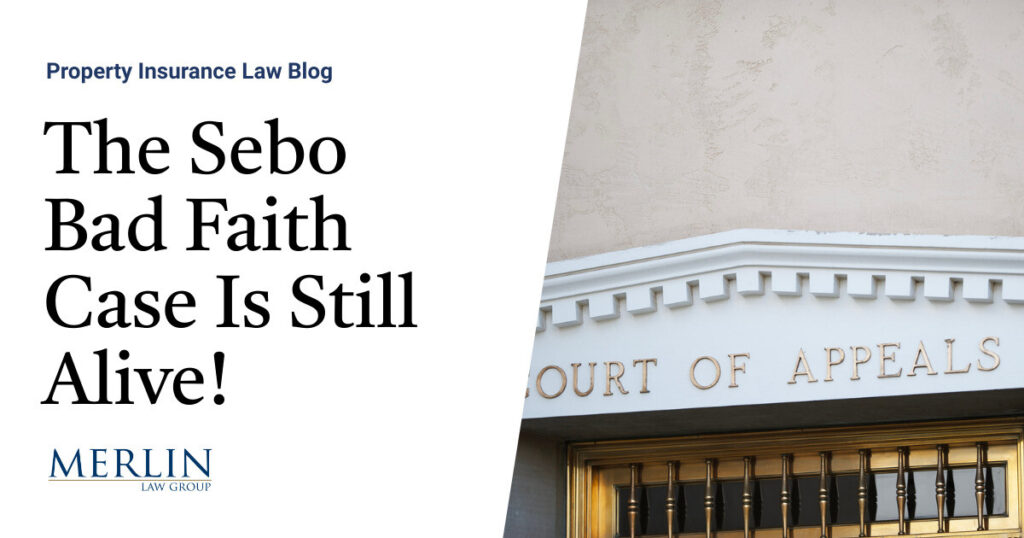The Sebo Bad Faith Case Is Still Alive!

The Sebo v. American Home Insurance Company case begs for a thought of the day quoting Yogi Berra. I last wrote about this case a year ago in Sebo Bad Faith Trial Results in Insurance Company Victory, and noted that “the trial had an all-star cast of attorneys for Sebo and American Home.”
The Sebo case is primarily known for Florida’s method of dealing with causation issues in first-party claims, as noted eight years ago in The Florida Supreme Court Clarifies What Rule to Apply When There Are Multiple Causes of Loss Under an All-Risk Policy. The Sebo water loss was reported in May 2005. The policyholder has been embroiled in trials and appeals ever since. The remaining issues involve the bad faith case, which Florida state courts do not allow to move forward until all coverage issues are resolved.
Two of those all-star attorneys, Mark Boyle and Hugh Lumpkin, filed an appellate brief for Sebo. Here are the main points discussed in the initial brief asserting that these errors denied him a fair trial and proper compensation for the insurer’s alleged bad faith:
Erroneous Evidence Admission: The trial court’s decision to allow evidence of third-party settlements was a critical error, claimed to have prejudicially influenced the jury by suggesting that Sebo was attempting a “money grab” despite these funds being irrelevant to the bad faith claims against the insurer.
Issue Preclusion Misapplication: The court misapplied legal principles by preventing Sebo from pursuing extra-contractual damages, which he argues were due to him because of the insurer’s conduct. This effectively limited his ability to claim certain damages that should have been separable from the initial coverage litigation.
Directed Verdict on Bad Faith Liability: Sebo contends that the trial court should have directed a verdict in his favor regarding the insurer’s liability for bad faith, based on uncontested evidence of statutory violations in the handling of his claims.
Flawed Verdict Form: The compound questions on the verdict form, as argued, prejudicially affected Sebo’s right to a fair consideration of separate and distinct damages and statutory violations by the insurer.
Reversal for Policyholder Protection: Sebo argues for a reversal based on a broader policy perspective that supports the enforcement of insurer accountability and protects the rights of policyholders under Florida law.
American Home has an excellent and very experienced appellate attorney, Jack Reiter, on brief. The primary points he raises in his brief in opposition to Sebo’s claims of error emphasize procedural correctness, the relevance of evidence, and the appropriateness of leaving certain decisions to the jury’s discretion:
Proper Evidence Admission: AIG argues that the trial court was correct in allowing evidence of Sebo’s settlements with third parties, asserting that these were relevant to the damage claims and did not prejudice Sebo. They contend that this information was not presented as set-offs by AIG, making it a fair consideration for jury review.
Issue and Claim Preclusion: AIG maintains that Sebo was barred from relitigating certain issues already decided in the coverage lawsuit, specifically regarding the allocation of fees and costs and the damages related to the house. They argue that principles of res judicata and collateral estoppel prevent Sebo from seeking additional recovery for these claims.
Denial of Directed Verdict on Bad Faith: The insurer supports the trial court’s decision to deny Sebo a directed verdict on the issue of bad faith. They argue that the question of whether AIG acted in bad faith was appropriately left to the jury as it involved factual determinations about the insurer’s conduct. This is an important point that most parties who win the trial raise when an appeal ensues.
Verdict Form and Punitive Damages: AIG argues that the verdict form was not flawed, as Sebo claimed. They assert that Sebo himself contributed to the design of the form and, therefore, cannot contest it. Additionally, AIG points out that Sebo did not establish the essential elements of his cause of action, which justifies the jury’s decision not to award punitive damages.
Absence of Other Grounds for Reversal: AIG contends that Sebo does not provide other valid grounds for reversing the trial court’s decision. They argue that the findings and decisions of the trial court were based on substantial evidence and correct legal standards.
Jury Issues: Lastly, AIG addresses Sebo’s contention about the necessity of juror interviews, asserting that Sebo did not preserve this issue for appeal and that the request for interviews was rightly denied.
Florida has a dearth of bad faith cases that ever go to trial. This is because the coverage and bad faith cases are not determined together. Most settlements require the policyholder to abandon the not-yet-brought bad faith lawsuit. So, having a bad faith case that is actually tried to verdict and then appealed is very novel in Florida jurisprudence. This is why we are studying these arguments and will await the appellate court’s decision on Florida’s bad faith law.
One lesson from this bad faith case is how long it may take to finally get to trial in Florida on a bad faith matter and how much attorney time and effort may take place. Florida’s unique requirement to prove that the insurer was engaged in a general business practice to make the insurer liable for punitive damages makes these cases much more complex than other states.
Thought For The Day
It ain’t over till it’s over.
—Yogi Berra







